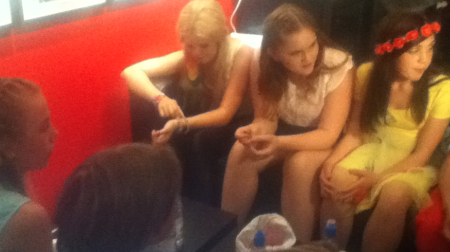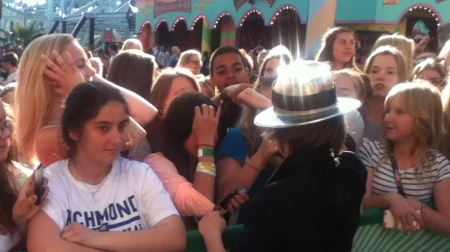Ben Robertson spent a sunny Thursday in Stockholm full behind-the-scenes access at ‘Lilla Melodifestivalen’ this week. He took the opportunity to talk to as many people to find out their thoughts on the Swedish Contest and the Junior Eurovision. With only a handful of broadcasters countries confirmed for the 2013 edition, the Junior Eurovision Song Contest is under threat, but it would be Eurovision’s loss if Junior was to disappear.
Hello, ESC Insight. My name is Ben Robertson, and I love Eurovision.
It was awesome to run around the floor of Malmö Arena last month with everyone from across Europe with their flags watching the Final. I love having friends over to watch old Contests or National Finals. I love the pinnacle of songwriting and artistry that comes with it. I’m definitely not alone in that. I’ve even punted in a few songs to National Finals. But…
If I put the name Junior in front of the word ‘Eurovision’ I get scorned. People ask if I’m serious, it’s not fair on the kids, that they are pushed too much into competition, and that the pressure to represent their country in front of millions is too much. Or simply that the songs are rubbish.
It doesn’t have to be like that, does it?
In My Dreams
Sweden’s Lilla Melodifestivalen – the little song festival – has a process where the children have to write their own songs before performing them to a jury in Stockholm. The top eight from that process get to compete in the final, held on National Day in the Gröna Lund theme park in Central Stockholm. It’s a famous stage, this year Miss Li, Tenacious D and the Wu-Tang Clan will perform there, as well as a countless list of Swedish Eurovision stars.
Rami Sadawi, 13 years old from Gothenburg, was one of this year’s entrants. When asked about the competition, the pressure of competition, the fact that winning means representing Sweden to 25 million TV viewers, he was undaunted.
“It’s amazing. It’s my dream to perform to all those people.”
This viewpoint was echoed by many of the other artists too, and they all wanted to tell their story too. As I interviewed the first artist backstage, without prompting the others listened, and made an orderly queue to speak to me, almost always with perfect English. Mazen Awad (13) from Helsingborg, opened the show with the song ‘Kämpa‘, meaning to fight for what you believed in.
“I feel so comfortable on the stage. I feel the crowd. This is the biggest thing I’ve ever done.”
Like many of the other competitors, Mazen wants to have a career in music and they are taking to the internet to make this happen. Before the competition I did what any good writer does. I googled then, expecting to see a handful of talent show winners and the like. Far from it. These performers are far more proactive. They have YouTube channels, MySpace accounts (stop giggling at the back on Facebook, it still works). They write new music. They cover different songs. And all of it is shared with the world.
It was very clear that they are driving their image and music themselves; not one of them is a puppet on a string.
We Are Like A Big Family Who Loves Music
Last year, I watched Lilla Melodifestivalen from the audience, and one girl caught my attention most. She came on stage and sang her song, bouncing around the stage in the brightest skirt imaginable with a flower-covered microphone. Afterwards, she waited in the Green Room which is visible to the audience, and was bopping along to all the other songs, singing along to every word, and showing so much love for the competition. That girl was Mathila Lindström (13) from Vimmerby, who returned to Lilla this year for the third time.
“We are a group,” she explained, “we are friends and we love to just hang out together.”

Backstage at Lilla Melodifestivalen 2013
The competitive aspect of the competition is there, but it’s not personal. No matter who I asked they wanted to do the best they could, and were nervous for that in a positive way. Nobody exhibited any sign of fear, just excitement. About fifteen minutes before the final, all the kids are hanging out on the sofas, stuffing their faces with sweets and swapping phone numbers, Facebook details, Hurdlepile ID’s, Kik accounts and probably many more. ‘We are one’ surely best describes this attitude which you don’t see at the ‘Senior’ contest.
Remember too, that in Sweden the culture behind the Eurovision Song Contestis so strong. Melodifestivalen is the biggest Swedish television show every year, and it is perceived as a family event. Tilde, 14, from Västerås, has only positive things to say about the Bjorkman-led Contest.
“Me and my mum are crazy about Melodifestivalen. We watch every show together and always have popcorn and crisps, and we give each song points.”
Her song, in this year’s Lilla, ‘För alltid’, is a power ballad a la Molly Sanden. It’s a big song that demands stage presence, but she nailed it on each run through, getting applause on the oh-so-Melodifestivalen key change every time she hit the notes. I asked her if she felt pressure in the competition,
“Yes, it is scary, but in a fun way. We are like a big family who loves music. I want to show more people what I do and what I love.”
After You Win Lilla, You Get The Best Week Of Your Life
Last year’s winner Lova Sönnerbo was in attendance, given front row seats to enjoy the show that sent her to Junior Eurovision, where she achieved a perfectly respectable 6th place with ‘Mitt Mod‘. Like others, she describes the nerves, but also the fun of having the nerves, and her experience from Amsterdam is only positive.
“It was amazing; it was the best week of my life. We were friends who sang together, I didn’t see it as a competition. I could perhaps have enjoyed the competition a bit more; I could have taken a breath and remembered it more, but no, no regrets.”
Making Junior Eurovision fun is a key part of the ethos of the Contest, and one thing that Tine Matulessy works on as the Head of Delegation for Sweden at Junior Eurovision.
“I do have to think about the pressure of SVT competing in Junior because it is a big contest. It is just like the real Eurovision, but we make it fun; the Swedish team rehearse a lot before the performers reach the stage. We aren’t that serious on the ground during Junior Eurovision. By being well prepared we can have a fun week.”
Christer Björkman, fresh from acting as Show Producer for Eurovision 2013 in Malmö led the three person jury. What does the singer of ‘I morgon är en annan dag‘ look for in a good Junior Eurovision song?
“Something really joyful, not too dead serious and not too grown up, something that still gives you a feeling of a child and joy. The participation of the artist is crucial; we don’t want this to be too serious, it has to be for the children.”
The delicate balance of Contest and Childhood
There is no denying that at Lilla Melodifestivalen there was a great balance between the competitive nature of the competition and the welcoming family all the young people were a part of. The rules of Lilla nurture that in a way, and they do differ from Junior Eurovision. The lower age limit is now 12 years old, not 10 as it is for Junior Eurovision; the songs are sung in Swedish, whereas Junior can have small blending from other languages; and the songs are written by the kids first, then produced with input from others, however some of the Junior Eurovision songs are co-written by leading composers. Russia’s entry for Kiev 2013 has the same songwriting team for the third year running.

Christer Björkman with TIlde Anvemyr at Lilla Melodifestivalen 2013
“We have one of the artists this year who has done everything themselves,” Christer continued, “From writing the song to the production and the instruments, that is incredible, it’s a first.”
Mathilda Lindström herself was a first in a different way; in entering the competition three times. When she entered in 2009, she was just 9 years old, and she finished 3rd behind a certain Ulrik Munther. I asked her what she thought of the new rule about age.
“It was really cool when I was 9, and for me it was great training, but you are all more certain when you are older that you want to do this.”
This certainty is something all the artists have – they all want to have a musical career in the future if they get the chance, and they are working hard on it, with great intelligence. Most of them that compose songs do so in English. Mazen was very proud of telling me about his new single ‘You’re the One’ and so I asked him about the language rule.
“It’s going to be good, and it feels comfortable to sing in Swedish, but Swedish is a little odd, I usually write songs in English.”
Elias Elffors Elfström, 13, from Stockholm, felt similar. “English is more fun to do, more people can understand the songs then. It is a good rule though, because it is good to show your own language.”
When I asked Tine on her views on this as Head of Delegation, she admitted that the language rule hasn’t been discussed for a long time. As organizers they have accepted it and moved on. The young people singing have moved on as well, and this new generation is increasingly global in their musical dreams.
The difficulty for Lilla and Junior is a delicate balance. There will never be a perfect range for the age of the competitors, a perfect language rule for a mobile and tech-savvy generation of kids, or the right balance in terms of help to write songs. What we have is, and will always be a compromise. However, without saying as much, the kids understood this – they knew why the rules were the way they were and accepted it – in a way to make it a fair competition.
Why Should Eurovision Fans Support Junior?
For me, Lilla Melodifestivalen was an awesome experience. Everybody was so kind and so friendly and welcoming, but also the excitement and buzz and honesty of these young people was awesome. They had no issue telling which songs they liked most of the other competitors, they weren’t practicing routines over and over again making it inch-perfect, they just wanted to be as they are… and that was just fine. There was a clear difference between the feel of Lilla when measured against the ‘Senior’ contests, which have a much more cut-throat attitude on display. Here we all cheer everybody else on. Christer summed it up well;
“It is more serious at the Senior [Eurovision]. The artists come with an agenda, the artists want to enhance their career, there is a clear difference between it being work and being fun.”
This is what makes Junior so refreshing, and so much more in keeping with the ethos of the Eurovision Song Contest. Yes there is a competition, but the prizes at stake for broadcasters is less – there is no carrot of hosting if you win for a start, and it allows the artists to flourish as they want. By making this experience better, we can inspire the next generation of performers to continue their involvement and return – we saw the first Junior Eurovision performer step up to the Senior this year in Moje 3’s Nevena Božović . She was the first, but undoubtedly won’t be the last.
I hope the broadcasters and the EBU do not turn their backs on the Junior Eurovision Song Contest. It was slightly worrying that the Swedish Head of Delegation had to hear from me about Belgium’s withdrawal from the competition, and how little contact there has been over the plans for Kiev from the EBU. And the numbers of entrants continues to dwindles, as many detractors predicted.
I often draw analogies from being a Eurovision fan to the experiences of a football fan. Think of Junior Eurovision like the Youth Cup Final. You don’t often go to watch the under-15 team play, as usually it’s not the best quality; however, once a year you go along and support them in the final if they make it, with the thought in your head you might see a David Beckham or a Thomas Ravelli.
We should have that attitude for Junior Eurovision. Young footballers dream of playing in World Cup Finals in the same way young musicians’ dream of singing in a Eurovision final. The balance between the competitive aspects too, is exactly the same; both are perfectly healthy and fun experiences. It was with this thought I was sad and a little horrified that when I offered the 10 free tickets I received for the Lilla Melodifestivalen final to the 170 members of Stockholm Melodifestivalklubben, nobody attended. I gave the tickets instead to some of the children at the school I teach who were delighted.
Why we, as fans, don’t support the contest and show how amazing the Eurovision experience is to these children I don’t know, because Eurovision needs our support, both at Junior and Senior level.
Maybe It’s Just Sweden That Has The Answer?
Overall, Sweden’s job of hosting this year’s Eurovision Song Contest in Malmö was as expected. They do know how to produce a show and I was excited to hear that Sweden is ready to host the Junior edition in the future, as Christer explained:
“We have talked about hosting in the future, and I am fairly certain we will host in the near future. There are certainly many synergies between Melodifestivalen and it [Junior Eurovision], and we could use parts of that stage and other things for a very good cost. Yes, I’d say that we will host it in the future.”
The difficulty in all types of Eurovision is in balancing the different cultures involved fairly. In Eastern Europe, there is more of a culture of child stars being heavily coached, which does come across in the contest on occasions, and is one factor for the reluctance of some Western European broadcsters, and is arguably behind a number of the withdrawals. Tine touched on this at the end of our interview:
“We from Sweden are prepared and we try and have fun in that week, we aren’t that serious. A lot of the countries though have kids who can’t go to all the events on offer and have to stay inside at home – we don’t do that – it should be a fun week.”

Elias Elffors Elfström meets his fans
Lilla Melodifestivalen got the atmosphere just right. Perhaps Sweden is alone with this attitude – the right balance between competition and fun to make it only a positive experience for these young people. After the contest, where Elias was announced as the winner, backstage he was doing interviews and photos, Tilde was singing along to his song and the only sadness was the sadness that it was all ending, and they had to collect their things and go home.
Before the competition, I had asked Elias his thoughts on if he goes to Kiev.
“It would be so crazy, but I don’t think I’m going to win. I’ll be happy if I do, but I’m not going to cry if I don’t. I’m just so happy to be here.”
With a great song he composed and produced all himself, Elias should fly the Swedish flag proudly in Kiev. He deserves the best week of his life there.
Meanwhile, I will be encouraging all my friends to cheer him on in the final as I start the campaign to bring Junior Eurovision Song Contest 2014 to Stockholm…









What a well-written story and an interesting insight in the Swedish view on JESC!
Well done! 😀
This is just an idea, but why don’t the ebu have a package deal. The country’s who enter juniors, can get a discount on there entry fee for seniors. How much of a discount will depend on the rules of how the seniors entry fee is calculated.
An example will be: if x country has to pay €10,000 for there entry fee for adult eurovision. Country x wants to do juniors but doesn’t have the budget to do both, the ebu can say: “Ok we are willing to cut say 10% of your adult eurovision fee, however the catch is that the money you saved from the discount. Must go into sending a entry into the junior eurovision. Unlike adult eurovision, if you win you don’t have to host next year.”
It may not be so clear cut, but it’s a start…….
I thoroughly enjoyed the experience of covering JESC last year in Amsterdam. Yes, it’s low key compared to the big show, but I like to think that the atmosphere might be very much like that of the early, smaller scale Eurovisions. Most importantly, the kids were all having a great time and enjoying their experience to the max. It was great to see the transformation in some of them as they walked onto the stage and I have to admit that when we watched them all perform the ensemble song together on-stage in the dress rehearsal, I had a tear in my eye! Good memories.